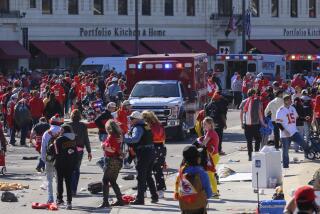Dealer Linked to Racist Shooter Charged
- Share via
CHICAGO — A central Illinois gun dealer who allegedly sold a white supremacist the two weapons used in a deadly Fourth of July weekend shooting spree was charged Wednesday with selling firearms illegally.
Federal officials said 64-year-old Donald R. Fiessinger of Pekin, Ill., sold the two pistols to Benjamin Nathaniel Smith, 21, in late June after a licensed gun dealer refused to sell to him. Fiessinger later helped authorities identify Smith as the man they were looking for in connection with the killings.
Smith’s rampage included shootings in and around Chicago, three other Illinois cities and Bloomington, Ind. Killed were former Northwestern University basketball coach Ricky Byrdsong and Won-Joon Yoon, a South Korean doctoral student at Indiana University. Nine other people were wounded.
The pistols used by Smith--a Bryco .380-caliber and a Sturm Ruger .22-caliber--were manufactured by two companies that for years have produced firearms particularly popular among criminals, according to tracing data from the U.S. Bureau of Alcohol, Tobacco and Firearms.
Sturm Ruger, based in Southport, Conn., makes a 9-millimeter pistol that ranked third last year among firearms traced by the ATF in criminal investigations. Bryco Industries of Costa Mesa is known as one of the half-dozen “ring of fire” manufacturers in the Los Angeles area that make cheap handguns. One or more of Bryco’s pistols ranked among the 10 most frequently traced firearms until 1995.
If convicted of doing business as an unlicensed dealer, officials said, Fiessinger could get as much as five years in prison and be fined as much as $250,000.
Although sales between private parties are not regulated, a license to buy and sell weapons must be obtained if federal regulators determine that an individual is engaging in the gun business.
Frequently, many gun sellers try to evade the law by insisting they are only selling their personal collections.
In Fiessinger’s case, according to an ATF affidavit, he was selling large quantities of guns and advertising heavily.
The affidavit charged that Fiessinger bought 65 mostly low-quality guns from Old Prairie Trading Post in Pekin between January 1997 and February 1999. ATF agents were already investigating Fiessinger when he allegedly sold Smith the Ruger pistol and the Bryco semiautomatic handgun, ATF special agent Jerry Singer in Chicago said.
And July 1, the day before Smith began his string of shootings, Fiessinger allegedly sold an undercover ATF agent two semiautomatic pistols: one made by Bryco and one .22-caliber pistol made by Phoenix Arms, another of the cheap-handgun makers in the Los Angeles area.
Fiessinger also discussed making additional sales with the undercover agent, the ATF said.
Later that same day, agents raided Fiessinger’s home, where they found 27 firearms, firearm records and $330 in cash.
“He [said] he knew he was acting as a small business and should have obtained a federal firearms license to do so legally,” the ATF affidavit said.
Fiessinger saw a newspaper description Tuesday of the killer and called ATF officials to say that Smith might be the person who bought some weapons from him and that documentation of the transaction probably was in some records agents had seized during the raid.
Fiessinger told agents that he had not known Smith before the sale and was not aware of his affiliation with a racist organization or of his plans to kill people. Fiessinger said Smith told him he was going use the Ruger for hunting.
Smith had turned to Fiessinger after he tried to buy two 9-millimeter handguns, a shotgun and several boxes of ammunition at a store in Peoria Heights, Ill. But he was turned down when a background check revealed that Smith’s ex-girlfriend Elizabeth Sahr had taken out a protection order against him.
“The system worked in this case by not allowing firearms to be sold [legally] to Mr. Smith,” Singer, the ATF spokesman, said.
Garen Wintemute, a gun expert and director of the Violence Prevention Center at UC Davis, agreed but added that it also demonstrates a major loophole in the law. He said that until Congress passes a measure to regulate all private sales, including those between individuals, it will be easy for criminals to skirt laws that prohibit them from owning guns.
Wintemute also said that Fiessinger’s arrest demonstrates the increasing effectiveness of the ATF’s gun tracing program, which requires dealers to provide a wealth of information about each sale.
Since 1993, the agency has quadrupled the number of gun traces, from about 50,000 annually to more than 200,000 last year.
The data collected from local law enforcement and gun dealers help the ATF identify individuals who are selling guns that ultimately end up being used in crimes.
This information helped the ATF discover Fiessinger’s purchases of large quantities of weapons.
*
Berry reported from Los Angeles and Slater from Chicago.
More to Read
Sign up for Essential California
The most important California stories and recommendations in your inbox every morning.
You may occasionally receive promotional content from the Los Angeles Times.













